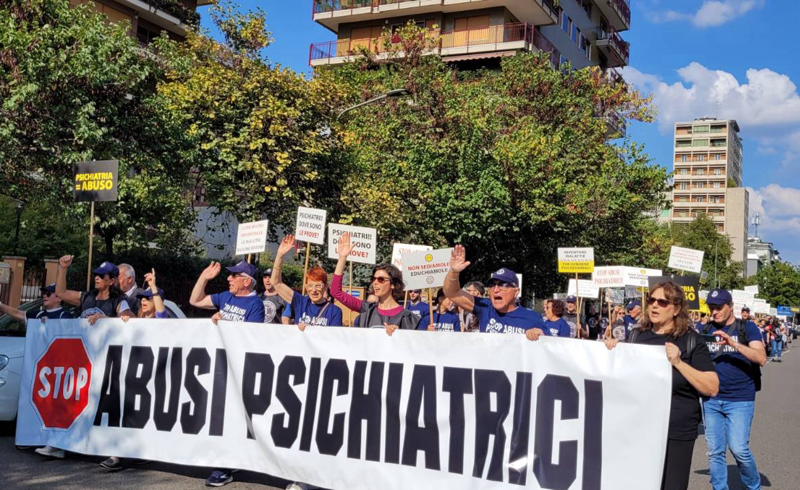Citizens Commission on Human Rights Italy demands an end to involuntary commitment and other human rights violations
Hundreds marched through the streets of Milan last month to the Milano Fiera City Convention Center, demanding that the European College of Neuropsychopharmacology (ECNP) annual congress implement the UN’s October 2023 mental health guidelines.

The protest focused on a flagrant form of abuse in Italy—the country’s involuntary commitment law known as TSO (trattamento sanitario obbligatorio), which permits compulsory mental health hospitalization without consent.
Italy’s Supreme Court, the Court of Cassation, recently raised the question of the unconstitutionality of TSO since it does not protect the right of individuals to be informed of the procedure or to defend themselves before a judge.
In October 2023, the World Health Organization and the UN High Commissioner for Human Rights issued joint guidance to end harmful practices and implement a humanitarian approach to mental health, centered on the person and oriented toward recovery and respect for human rights. A year later, psychiatry has failed to take action.
The October 2023 UN guidance:
- Calls for ending coercive practices in mental health, such as involuntary detention, forced treatment, seclusion and restraints. This
is essential to respect the right to make decisions about one’s own
healthcare and treatment choices. - Details how coercive practices negatively impact physical and mental
health, often
compounding a person’s existing condition while alienating them from their
support systems. - Proposes legislative provisions to end coercion in mental health services and enshrine free and informed consent as the basis of all mental health-related interventions. It
also provides guidance on addressing more complex and challenging cases through
legislation and policies that do not resort to coercive practices.
CCHR presented an open letter to the leaders of the ECNP, demanding to know what they intend to do to rapidly comply with these UN guidelines.
Before the convention, to raise awareness of the need to bring psychiatry under the law, CCHR brought their Psychiatry: An Industry of Death Exhibit to Palazzo dei Giureconsulti in Milano, the oldest and most central convention space in the city.
The keynote speaker, a psychologist and psychotherapist, spoke of the threat psychotropic drugs pose to future generations. Many of these drugs have been labeled with black box warnings because they increase the risk of suicidal thoughts and behaviors in children, adolescents, and young adults.
After touring the exhibit, many visitors commented that they now understand the danger of coercive, inhumane treatments and violations of people’s fundamental rights in the field of mental health—and the need to take effective action to end them.
The work of Citizens Commission on Human Rights is inspired by visionary humanitarian and Scientology Founder L. Ron Hubbard, who urged Scientologists to expose and help abolish any and all physically damaging practices in the field of mental health, help clean up and keep clean the field of mental health, and bring about an atmosphere of safety and security by eradicating its abuses and brutality.
For more information, visit the CCHR website, or watch documentaries on the work of CCHR in countries around the world and the film Psychiatry: An Industry of Death on the Scientology Network.

